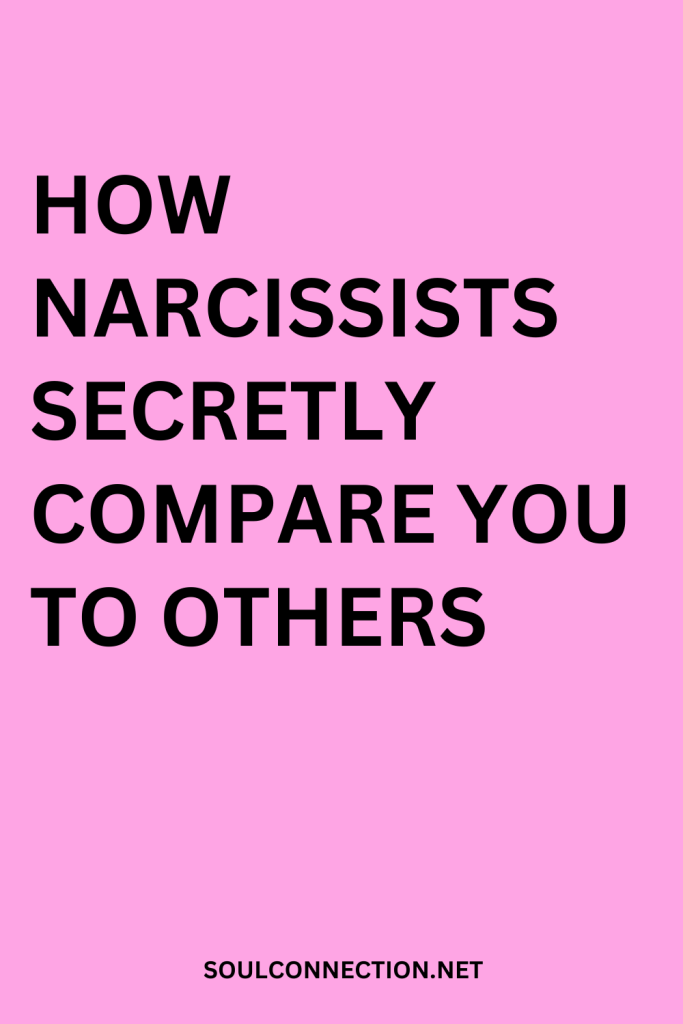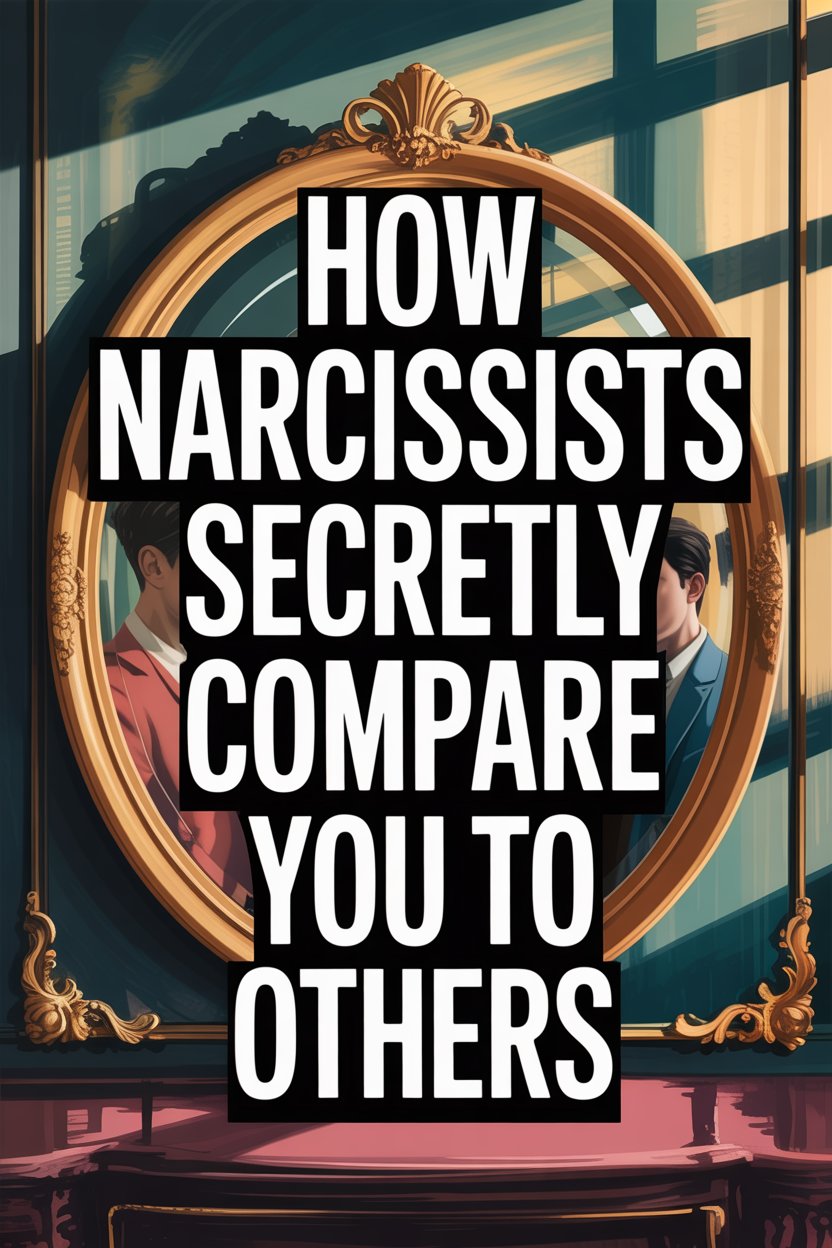Ever had a partner who brings up someone else’s accomplishments in casual conversation, only to glance at you with a sly smile?
If so, welcome to the not-so-glamorous Olympics of Narcissistic Comparison, where you didn’t sign up for the competition but somehow ended up as a reluctant contestant.
Narcissists are masters at secret comparison games, and not in a “healthy rivalry” sort of way. Let’s unpack how these behind-the-scenes comparisons work, why they happen, and what you can do when you spot them.
The Not-So-Subtle Art of Dropping Names
Narcissists have an uncanny ability to bring up the “incredible” achievements of others, always with strategic timing.
Dinner’s on the table, you mention your new job, and suddenly you’re hearing about how their ex landed a six-figure promotion and speaks three languages. Coincidence? Not likely.
Rather than offering genuine support for your accomplishments, a narcissist often responds with tales of people who, in their eyes, have done it bigger, better, or with more flair.
The comparison is usually veiled in a compliment or a “just saying,” but the message is clear: don’t get too comfortable on that pedestal.
Emotional Benchmarks, Set by Others
Feeling like you’re constantly being measured against an invisible standard? That’s no accident. Narcissists are notorious for using other people’s reactions, relationships, or even appearance as a yardstick.
If a friend’s partner is more “affectionate,” suddenly you’re getting side-eyed for not being touchy-feely enough.
This isn’t about helping you grow or sharing helpful feedback—it’s about nudging you into an endless game of catch-up. The rules? The goalposts move every time you get close. Fun, right?
Idolizing Strangers or Exes to Keep You on Your Toes
Spotting a narcissist in the wild often means enduring endless anecdotes about their “amazing” friend Lauren, who “never argues about little things,” or the ex who “just got them.”
These stories aren’t shared for your mutual entertainment.
They’re subtle reminders that perfection is out there, and—surprise!—it isn’t you.
The idolizing often comes out when you’re asserting a need or boundary, almost as if to say, “If you were more like Lauren, life would be a beach vacation.” (Spoiler alert: Lauren probably had her own opinions, too.)
Social Media: The Narcissist’s Comparison Playground
Scroll through Instagram together and watch the magic happen.
A narcissist might comment on other couples’ vacations, bodies, home décor, or careers, always with a hint of wistfulness or not-so-gentle encouragement for you to “check out how they do it.”
The curated feeds and filtered selfies become ammunition, not inspiration. If you ever feel like you’re in a never-ending audition for “Best Partner,” you’re not imagining things.
Faux Praise With a Side of Shade
Compliments from narcissists sometimes arrive with a booby trap. Picture this: “Wow, the lasagna was really good! Susan always uses fresh herbs, but this is nice too.”
The praise is real—ish—but there’s always a subtle reminder that someone else has set the bar just a bit higher.
These offhand remarks aren’t meant to motivate; they’re calculated to keep you striving, doubting, and (ideally, for them) just a smidge insecure.
Competing Instead of Connecting
Relationships thrive on partnership, not rivalry. When you share a win, does your partner instantly recount how someone else did the same thing, but bigger? This isn’t accidental.
Narcissists struggle to celebrate you without dragging in someone else’s highlight reel.
It’s not because they think you’re not enough—it’s because their own self-esteem depends on triangulating, manipulating, and creating hierarchy, even if it’s just in their own head.
Turning Private Moments Into Public Pressure
Ever had a disagreement at home, only to hear later, “Even my friends think I’m right,” or “My cousin never has this issue with his wife”?
Narcissists love to reference invisible panels of judges who are apparently weighing in on your every move.
Bringing in outsiders—even imaginary ones—adds extra pressure and makes you question your own perspective. It’s not just about who’s right; it’s about ensuring you feel like you’re being watched, measured, and found wanting.
Weaponizing Vulnerabilities
Ever confided an insecurity or past struggle, then later had it casually compared to someone else’s “grit” or “resilience”? Narcissists store these details for future use, often at the most flattering (for them) or humiliating (for you) moments.
Suddenly, your vulnerability becomes a way for them to highlight how others “got over it” faster, or didn’t “let it get to them.” Compassion is not the goal—control is.
The Sly Comparison of Physical Appearance
Narcissists can be experts at passive-aggressive remarks about looks. “You’d look so good if you wore your hair like Jessica,” or “Mark’s girlfriend always wears makeup, she just glows.”
Subtle? Not really. The message is meant to chip away at your confidence and keep you second-guessing. The more you try to meet their ever-changing standards, the more they shift.
Gaslighting Your Reaction
Confronting these comparisons rarely goes well. If you point out the pattern, the narcissist might act bewildered: “You’re so sensitive. I was just making conversation. You’re imagining things.”
This gaslighting compounds the confusion. Suddenly, you’re questioning not only your adequacy, but your grip on reality. Mission accomplished—from their perspective.
Why Do Narcissists Play the Comparison Game?
This isn’t just a quirky personality trait. For narcissists, comparison is a tool to maintain a sense of superiority and control. By making you feel deficient, they prop up their own fragile self-esteem.
It’s not about your value (which is, by the way, just fine)—it’s about a chronic need to feel one-up, no matter what it costs the relationship.
Why It’s So Hard to Recognize What’s Happening
Narcissists rarely come at you with a direct “You’re not good enough.” The art lies in the subtlety—side comments, backhanded compliments, casual asides. They want plausible deniability.
Since the comparisons are usually presented as concern, advice, or “just being honest,” you can spend months (or years) trying to work out why you’re always running a race that never ends.
Reclaim Control of Your Self-Image
Spot the comparison game? Time to tap out. Your value isn’t dependent on how you stack up against their co-worker’s spouse or Instagram influencer du jour.
Set your own benchmarks. When a comparison sneaks into conversation, redirect: “I’m happy with who I am and what we have.” If they try to argue, remind yourself: it’s not about logic. It’s about their need for dominance.
Healthy Relationships Don’t Keep Score
Genuine connection thrives when partners build each other up—not keep a spreadsheet of who’s doing better, thinner, richer, or more entertaining.
If your partner is always holding you up to someone else’s imagined standard, the issue isn’t your performance—it’s their inability to love without competition.
Notice the pattern, and ask for what you need: “I’d love your support for what I achieved, not how it measures up to someone else.” If the comparisons keep coming, consider what’s really keeping you there.
Setting Boundaries Like a Pro
Boundaries aren’t just for toddlers and WiFi routers. When the narcissist starts in with the comparisons, interrupt: “Please don’t compare me to others. I’m not them, and I don’t want to be.”
They probably won’t love it. You might even get pushback, tears, or a surprise monologue about how “no one ever listens.” Stand firm. Repetition is your friend here.
When It’s Time to Get Support
Leaving, confronting, or even just surviving a relationship full of constant comparison can feel lonely. You’re not crazy, needy, or too sensitive. It’s okay to reach out to friends, a therapist, or a local support group.
Sometimes it helps just to have someone say, “No, you’re not imagining it. That’s not normal.”
Finding Your Footing After Narcissistic Comparisons
The longer you’ve been stuck in someone else’s measuring contest, the harder it is to remember you ever had your own yardstick. Rebuilding self-worth takes time, and it’s completely possible.
Start with small, defiant acts of self-approval. Wear what you love. Celebrate your wins, even if no one else throws confetti. Set boundaries around what you’re willing to listen to.
Gradually, the comparisons lose their sting—and their hold.
The Comparison Game Is Rigged
Spoiler: No matter how much you stretch, twist, or hustle, the narcissist’s comparison game is unwinnable. T
he rules aren’t fair, the goalposts keep shifting, and the prize is…drumroll…more of the same.
Stepping out of the competition might be the bravest—and healthiest—move you make. Your self-worth isn’t up for debate, and it certainly isn’t a spectator sport.


